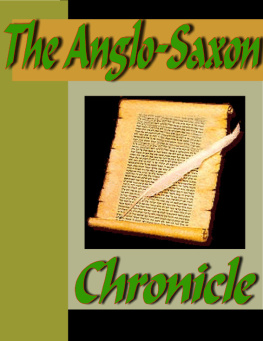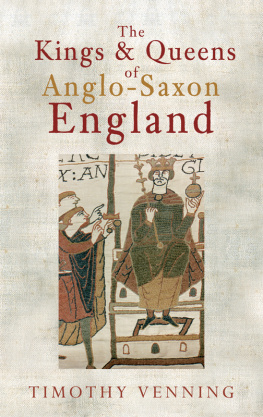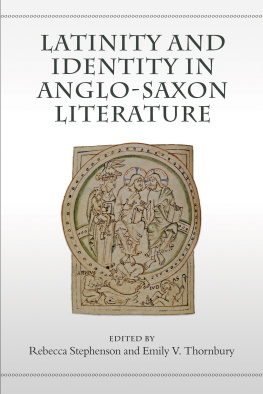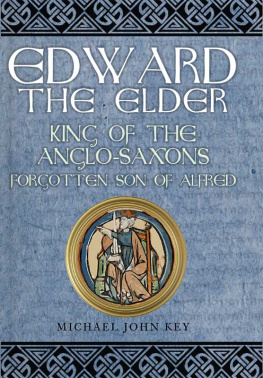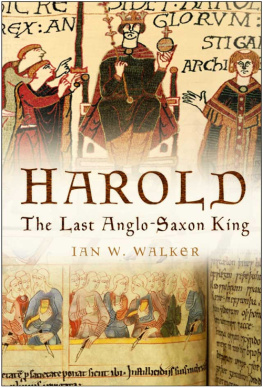Ingram - The Anglo-Saxon chronicles
Here you can read online Ingram - The Anglo-Saxon chronicles full text of the book (entire story) in english for free. Download pdf and epub, get meaning, cover and reviews about this ebook. City: Belle Fourche;Great Britain, year: 2011;2004, publisher: NuVision Publications, genre: Religion. Description of the work, (preface) as well as reviews are available. Best literature library LitArk.com created for fans of good reading and offers a wide selection of genres:
Romance novel
Science fiction
Adventure
Detective
Science
History
Home and family
Prose
Art
Politics
Computer
Non-fiction
Religion
Business
Children
Humor
Choose a favorite category and find really read worthwhile books. Enjoy immersion in the world of imagination, feel the emotions of the characters or learn something new for yourself, make an fascinating discovery.
The Anglo-Saxon chronicles: summary, description and annotation
We offer to read an annotation, description, summary or preface (depends on what the author of the book "The Anglo-Saxon chronicles" wrote himself). If you haven't found the necessary information about the book — write in the comments, we will try to find it.
The Anglo-Saxon chronicles — read online for free the complete book (whole text) full work
Below is the text of the book, divided by pages. System saving the place of the last page read, allows you to conveniently read the book "The Anglo-Saxon chronicles" online for free, without having to search again every time where you left off. Put a bookmark, and you can go to the page where you finished reading at any time.
Font size:
Interval:
Bookmark:
The Anglo-Saxon Chronicle
Anonymous
Translation by Rev. James Ingram
Originally compiled on the orders of King Alfred the Great, approximately A.D., and subsequently maintained and added to by generations of anonymou s scribes until the middle of the 12th Century. The original language is Anglo-Saxon (Old English), but later entries are essentially Middle English in tone.
This eBook has been published by:
NuVision
Publications

Publishing Date: 2004
ISBN# 1-59547-275-4
Please see our website for several e-books created for education, research and entertainment.
Most eBooks are available in paperback.
Specializing in rare, out-of-print books still in demand .
Contact:
URL: http://www.nuvisionpublications.com
INTRODUCTION TO INGRAM'S EDITION [1823]
England may boast of two substantial monuments of its early history; to either of which it would not be easy to find a parallel in any nation, ancient or modern. These are, the Record of Doomsday chronicle, as the editor considered it. The text of the present edition, it was found, could not be compressed within a shorter compass than 374 pages, though the editor has suppressed many notes and illustrations, which may be thought necessary to the general reader. Some variations in the MSS. may also still remain unnoticed; partly because they were considered of little importance, and partly from an apprehension, lest the commentary, as it sometimes happens, should seem an unwieldy burthen, rather than a necessary appendage, to the text. Indeed, till the editor had made some progress in the work, he could not have imagined that so many original and authentic materials of our history still remained unpublished.
To those who are unacquainted with this monument of our national antiquities, two questions appear requisite to be answered: -- "What does it contain?" and, "By whom was it written?" The indulgence of the critical antiquary is solicited, whilst we endeavour to answer, in some degree, each of these questions.
To the first question we answer, that the "Saxon Chronicle" contains the original and authentic testimony of contemporary writers to the most important transactions of our forefathers, both by sea and land, from their first arrival in this country to the year 1154. Were we to descend to particulars, it would require a volume to discuss the great variety of subjects which it embraces. Suffice it to say, that every reader will here find many interesting facts relative to our architecture, our agriculture, our coinage, our commerce, our naval and military glory, our laws, our liberty, and our religion. In this edition, also, will be found numerous specimens of Saxon poetry, never before printed, which might form the ground-work of an introductory volume to Warton's elaborate annals of English Poetry. Philosophically considered, this ancient record is the second great phenomenon in the history of mankind. For, if we except the sacred annals of the Jews, contained in the several books of the Old Testament, there is no other work extant, ancient or modern, which exhibits at one view a regular and chronological panorama of a PEOPLE, described in rapid succession by different writers, through so many ages, in their own vernacular LANGUAGE. Hence it may safely be considered, nor only as the primaeval source from which all subsequent historians of English affairs have principally derived their materials, and consequently the criterion by which they are to be judged, but also as the faithful depository of our national idiom; affording, at the same time, to the scientific investigator of the human mind a very interesting and extraordinary example of the changes incident to a language, as well as to a nation, in its progress from rudeness to refinement.
But that the reader may more clearly see how much we are indebted to the "Saxon Chronicle", it will be necessary to examine what is contained in other sources of our history, prior to the accession of Henry II., the period wherein this invaluable record terminates.
The most ancient historian of our own island, whose work has been preserved, is Gildas, who flourished in the latter part of the sixth century. British antiquaries of the present day will doubtless forgive me, if I leave in their original obscurity the prophecies of Merlin, and the exploits of King Arthur, with all the Knights of the Round Table, as scarcely coming within the verge of history. Notwithstanding, also, the authority of Bale, and of the writers whom he follows, I cannot persuade myself to rank Joseph of Arimathea, Arviragus, and Bonduca, or even the Emperor Constantine himself, among the illustrious writers of Great Britain. I begin, therefore, with Gildas; because, though he did not compile a regular history of the island, he has left us, amidst a cumbrous mass of pompous rhapsody and querulous declamation some curious descriptions of the character and manners of the inhabitants; not only the Britons and Sax ons, but the Picts and Scots . But there is, throughout, such a want of precision and simplicity, such a barrenness of facts amidst a multiplicity of words, such a scantiness of names of places and persons, of dates, and other circumstances, that we are obliged to have recourse to the Saxon Annals, or to Venerable Bede, to supply the absence of those two great lights of history -- Chronology and Topography.
The next historian worth notice here is Nennius, who is supposed to have flourished in the seventh century: but the work ascribed to him is so full of interpolations and corruptions, introduced by his transcribers, and particularly by a simpleton who is called Samuel, or his master Beulanus, or both, who appear to have lived in the ninth century, that it is difficult to say how much of this motley production is original and authentic. Be that as it may, the writer of the copy printed by Gale bears ample testimony to the "Saxon Chronicle", and says expressly, that he compiled his history partly from the rec ords of the Scots and Saxons ; filled with legendary tales of Trojan antiquity, of magical delusion, and of the miraculous exploits of St. Germain and St. Patrick: not to mention those of the valiant Arthur, who is said to have felled to the ground in one day, single-handed, eight hundred and forty Saxons! It is remarkable, that this taste for the marvelous, which does not seem to be adapted to the sober sense of Englishmen, was afterwards revived in all its glory by Geoffrey of Monmouth in the Norman age of credulity and romance.
We come now to a more cheering prospect; and behold a steady light reflected on the "Saxon Chronicle" by the "Ecclesiastical History" of Bede; a writer who, without the intervention of any legendary tale, truly dese rves the title of Venerable . He thinks it necessary to give his reasons, on one occasion, for inserting from these very "Annals" what he did not find in Bede; though it is obvious, that the best part of his materials, almost to his own times, is derived from the same source.
The object of Bishop Asser, the biographer of Alfred, who comes next in order, was to deliver to posterity a complete memorial of that sovereign, and of the transactions of his reign. To him alone are we indebted for the detail of many interesting circumstances in the life and ch aracter of his royal patron . Much difference of opinion exists respecting this work; into the discussion of which it is not our present purpose to enter. One thing is remarkable: it contains the vision of Drihtelm, copied from Bede, and that of Charles King of the Franks, which Malmsbury thought it worth while to repeat in his "History of the Kings of England". What Gale observes concerning the "fidelity" with which these annals of Asser are copied by Marianus, is easily explained. They both translated from the "Saxon Chronicle", as did also Florence of Worcester, who interpolated Marianus; of whom we shall speak hereafter.
Next pageFont size:
Interval:
Bookmark:
Similar books «The Anglo-Saxon chronicles»
Look at similar books to The Anglo-Saxon chronicles. We have selected literature similar in name and meaning in the hope of providing readers with more options to find new, interesting, not yet read works.
Discussion, reviews of the book The Anglo-Saxon chronicles and just readers' own opinions. Leave your comments, write what you think about the work, its meaning or the main characters. Specify what exactly you liked and what you didn't like, and why you think so.

